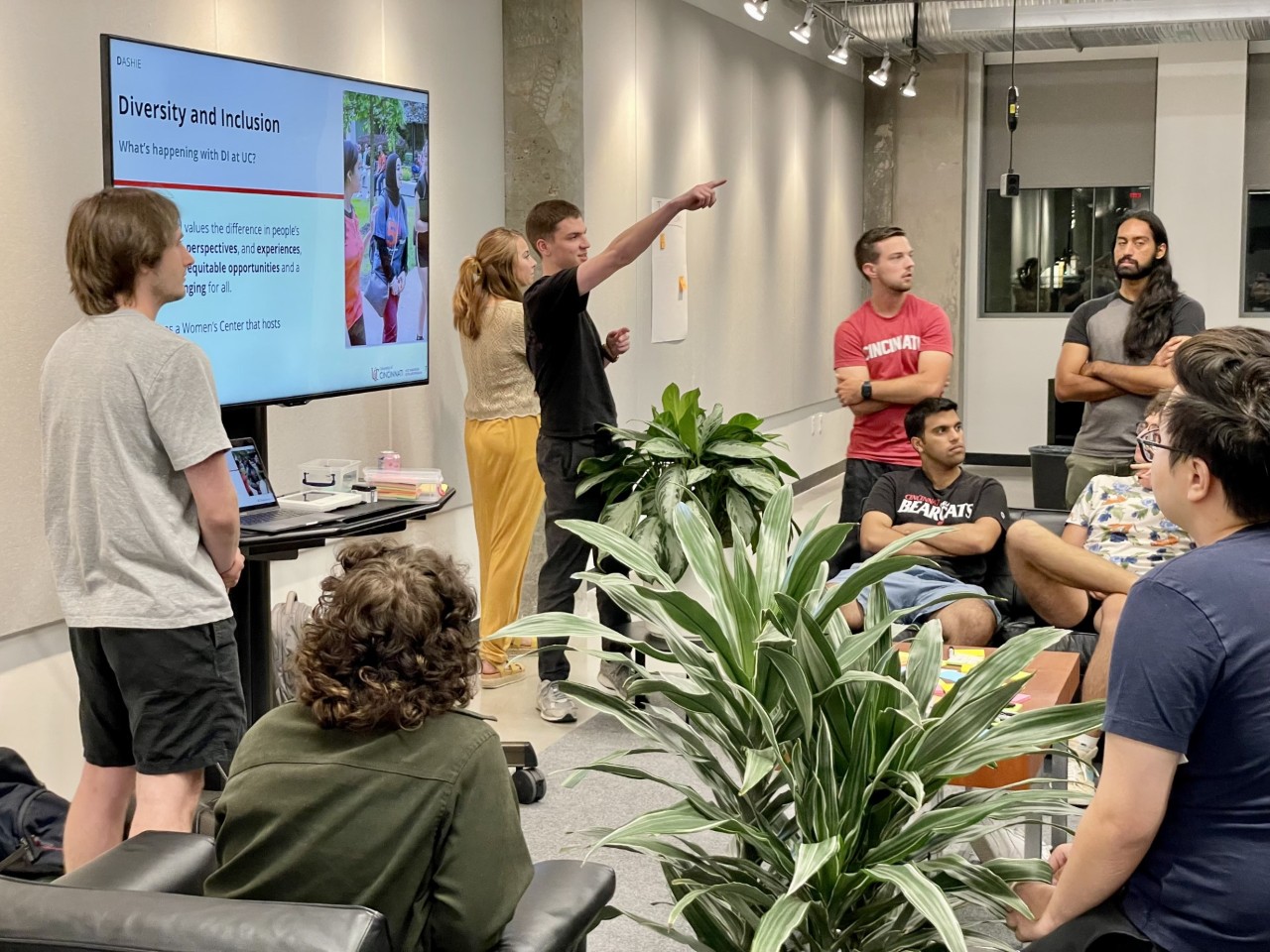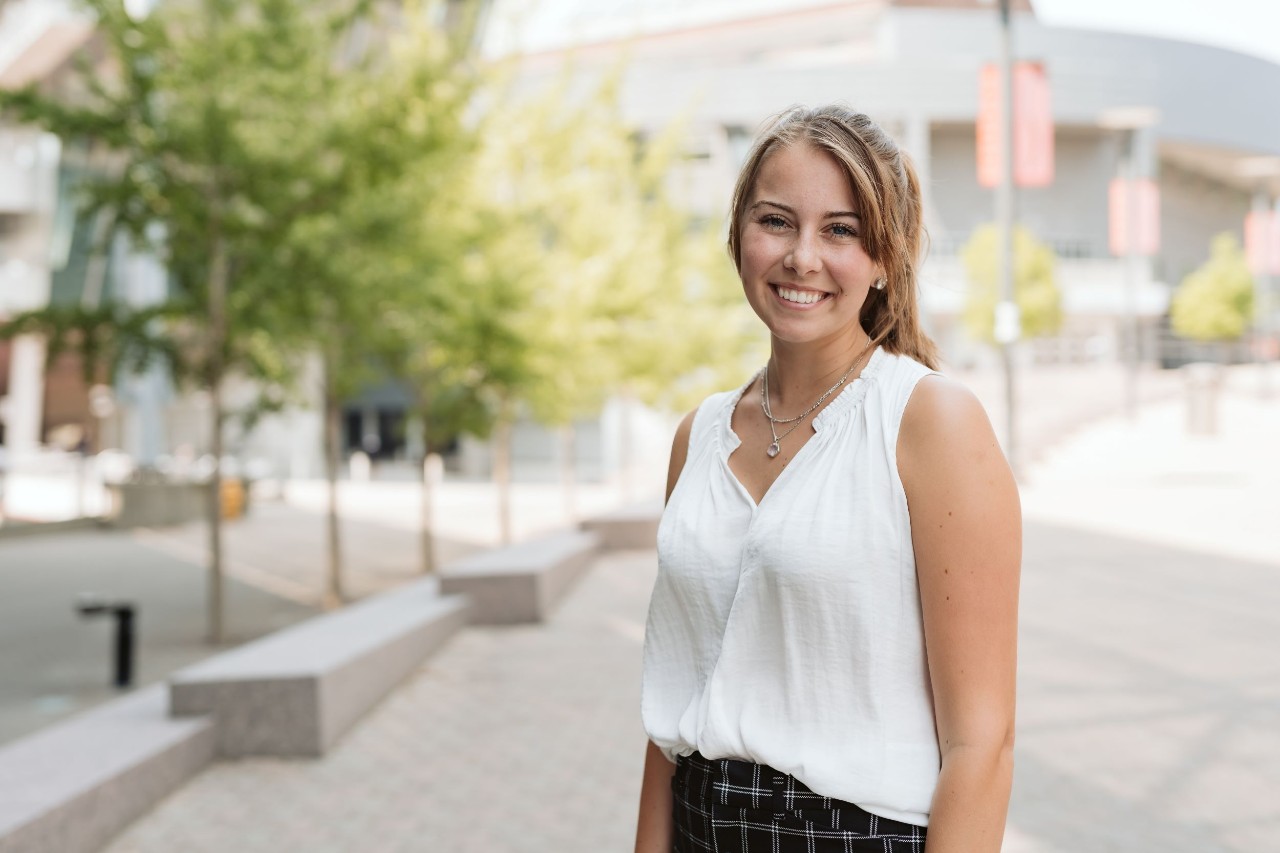
UC students create change through innovation fellowship
Three Bearcats chosen for the prestigious Stanford University program
Three students from the University of Cincinnati have been named University Innovation Fellows.
The program is run by Stanford University’s Hasso Plattner Institute of Design and is designed to empower students to become agents of change at their higher education institutions.
UC fellows from this year include:
- Maxwell Kemats, economics major from Salem, Ohio, University Honors Program, Cincinnatus Scholar, Lindner College of Business, class of 2026
- Yale Miller, computer science major from Toledo, Ohio, University Honors Program, College of Engineering and Applied Science, class of 2026
- Caroline Berger, industrial design major from Columbus, Ohio, University Honors Program, College of Design, Architecture, Art, and Planning, class of 2026.
University Innovation Fellows are nominated by faculty and administrators as individuals or teams of students and are selected each year through an application process. Following acceptance into the program, students participate in a six-week online training experience where they learn to analyze their campus ecosystems and identify opportunities for change related to innovation, design thinking and creativity.

Caroline Berger/photo provided
Throughout their training, teams are mentored by a program alum appointed by the Stanford team, and coaching from their on-campus faculty champion. At UC, Aaron Bradley, associate professor and director of the NEXT Innovation Scholars program, is faculty champion for the University Innovation Fellows program.
“Students who enter this program are charged with exploring their campus landscape through a human-centered design lens and looking for opportunities to introduce innovation and make enhancements to the student experience,” explains Bradley. “As their faculty champion, my role is to empower the fellows to do their best work and have the biggest possible impact. It’s a balance of challenging them to think boldly while making sure their ideas are viable and aligned with UC’s Next Lives Here strategic direction.”
A total of 261 students have been named 2023 University Innovation Fellows. They represent 68 higher education institutions in 15 countries.

Maxwell Kemats/photo provided.
“It’s an honor and very much a privilege to be part of the University Innovation Fellows program,” says Berger. “It’s a wonderful training program that I hope will lead us into a lifetime of resources and that will equip us with important design thinking and human-centric design skills so we can be catalysts for change at UC and beyond.”
The program challenges students to understand the needs of peers across disciplines and the perspectives of faculty and administrators, and then apply this knowledge to design new educational opportunities for their peers. After training, fellows implement the projects they crafted and continue to serve as leaders at their schools until graduation, often staying connected to their projects as alumni. They serve as advocates for lasting change, lending the much-needed student voice to the conversations about the future of higher education.
“I feel like the University Innovation Fellows program really empowers me to give back to the community,” says Kemats. “I am inspired to learn more about innovation and refine my skills and mindset to make meaningful change a reality.”
Miller says he feels like he and his colleagues entered the UIF program well prepared because of the camaraderie they developed while working on projects as part of the NEXT innovation Scholars program.
"I think it has been a great experience working as a team and I think what we have done as NEXT Innovation Scholars has prepared us to succeed at UIF in a way that's unprecedented. Typically, teams come together in UIF and they don't know each other and they aren't necessarily experienced in the kind of work that they are going to be trained on. But for us we have already worked on mini projects with NEXT Innovation and we were ready to run from the beginning."

Yale Miller/photo provided
This is the third year that UC students have been accepted to the UIF program. Previous UC UIF teams have created an interactive design thinking and innovation class module now taught in every UHP honors gateway course and a series of design thinking workshops for Cincinnati area high school students in UC’s Upward Bound program.
Learn more about the UC fellows from 2021 and 2022 online.
Berger, Miller and Kemats say they are excited to develop a project that will benefit the campus ecosystem. They have until April to complete the project and will present their work at a conference of University Innovation Fellows from across the world in the Netherlands.
“I’m very excited to see the impact that Caroline, Max, and Yale have moving forward," says Bradley. "They’ve joined a global community of peers who are change-makers on their campuses. Being associated with the Stanford design school is an honor, and gaining access to the resources and network this brings levels them up.”
Featured top image shows Yale Miller (far left standing) with Max Kemats (center pointing) and Caroline Berger standing nearby during a meeting of the NEXT Innovation Scholars. Photo provided.
Become a Bearcat
Whether you’re a first-generation student or from a family of Bearcats, UC is proud to support you at every step along your journey. We want to make sure you succeed — and feel right at home.
Related Stories
UC Day of Giving kicks off with celebration of scholarship gift
April 15, 2021
UC Day of Giving is kicked off with an important scholarship gift for nursing and engineering.
UC engineering students recognized for achievement in cooperative education
April 12, 2021
Top students in engineering cooperative education for 2020-21
UC staff have elected their 2021-23 Staff Senators
June 8, 2021
Join us in congratulating the 2021-23 new Staff Senate members! Elections were held in early May, and new senators will begin their two-year term in July 2021. All UC staff are encouraged to be part of the enthusiasm and excitement for our new senators by attending the Staff Senate online meeting via WebEx, June 30, 9-11 a.m.
UC Simulation Center Student Profiles
July 19, 2021
A glimpse into the background of students working at the Sim Center
What are common misconceptions about engineering?
From expertise in math to being a creative problem solver, Teri Reed explains myths and misconceptions about engineering and why you should be an engineer!
Science Daily: Bat calls contain redundant information
July 20, 2021
UC assistant professor Dieter Vanderelst in UC's College of Arts and Sciences and College of Engineering and Applied Science digitally compressed the echoes of Mexican free-tailed bats and found they lost little valuable information.
CNBC: How do you land your first job out of college?
August 5, 2021
UC College of Engineering and Applied Science student Danielle Hall talks to CNBC about the benefits of co-op at UC.
Aerospace Students Soar to Excellence at SciTech
February 21, 2016
Four UC CEAS aerospace PhD students present at the 2016 AIAA SciTech Conference in San Diego.
Hyperloop UC Hinges on Revolutionizing High-Speed Transportation
March 6, 2016
UC is the only university from Ohio to advance to the final round of the international SpaceX Hyperloop Pod Competition.
UC Celebrates a Military Milestone at Sheakley Athletics Center on April 1
March 28, 2016
Marking the 100-year anniversary of ROTC in the United States, UC's Army and Air Force ROTC will hold a Presidential Joint Review and Retreat Ceremony on April 1, where they will announce the 2016 ROTC Hall of Fame nominees.
